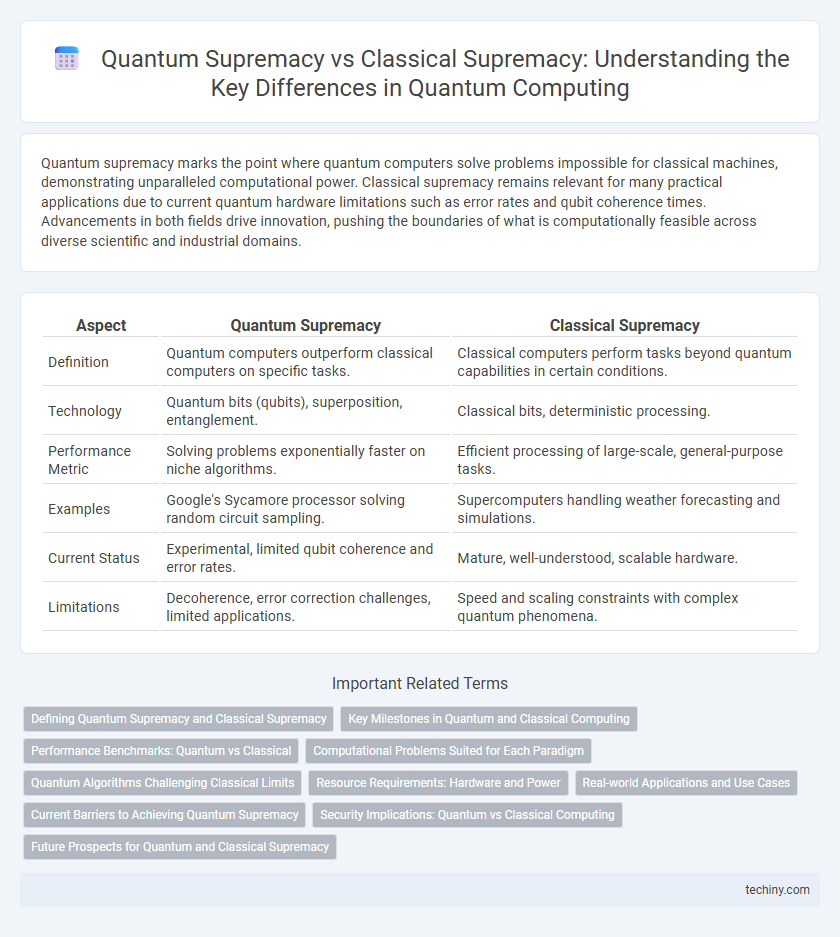Quantum supremacy marks the point where quantum computers solve problems impossible for classical machines, demonstrating unparalleled computational power. Classical supremacy remains relevant for many practical applications due to current quantum hardware limitations such as error rates and qubit coherence times. Advancements in both fields drive innovation, pushing the boundaries of what is computationally feasible across diverse scientific and industrial domains.
Table of Comparison
| Aspect | Quantum Supremacy | Classical Supremacy |
|---|---|---|
| Definition | Quantum computers outperform classical computers on specific tasks. | Classical computers perform tasks beyond quantum capabilities in certain conditions. |
| Technology | Quantum bits (qubits), superposition, entanglement. | Classical bits, deterministic processing. |
| Performance Metric | Solving problems exponentially faster on niche algorithms. | Efficient processing of large-scale, general-purpose tasks. |
| Examples | Google's Sycamore processor solving random circuit sampling. | Supercomputers handling weather forecasting and simulations. |
| Current Status | Experimental, limited qubit coherence and error rates. | Mature, well-understood, scalable hardware. |
| Limitations | Decoherence, error correction challenges, limited applications. | Speed and scaling constraints with complex quantum phenomena. |
Defining Quantum Supremacy and Classical Supremacy
Quantum supremacy refers to the point at which a quantum computer can solve a problem or perform a calculation faster than the most advanced classical supercomputers, demonstrating an unequivocal computational advantage. Classical supremacy denotes the continued dominance of classical computing systems, where traditional algorithms and hardware remain more efficient or practical for most real-world applications. Defining these terms involves evaluating problem complexity, error rates, and computational speed, with quantum supremacy marking a pivotal milestone in computational capability beyond classical limits.
Key Milestones in Quantum and Classical Computing
Quantum supremacy marks the milestone where quantum computers solve problems beyond classical capabilities, exemplified by Google's 2019 achievement using the Sycamore processor to perform a specific task in 200 seconds that would take the fastest supercomputer 10,000 years. Classical supremacy refers to the continuous advancements in classical computing, highlighted by developments such as IBM's Summit supercomputer, which remains essential for large-scale simulations and data processing. Key milestones in both domains showcase the ongoing competition and complementarity between quantum and classical technologies in advancing computational power.
Performance Benchmarks: Quantum vs Classical
Quantum supremacy is demonstrated when a quantum computer solves a problem that classical supercomputers cannot complete within a feasible timeframe, showcasing superior performance on specialized tasks like random circuit sampling. Classical supremacy remains dominant in large-scale numerical simulations and optimization problems, where classical algorithms and hardware are highly optimized and scalable. Performance benchmarks comparing both approaches highlight the niche advantages of quantum devices in complexity and solution space exploration, while classical systems excel in reliability and mature computational frameworks.
Computational Problems Suited for Each Paradigm
Quantum supremacy excels in solving specific computational problems such as integer factorization, quantum simulation of molecular systems, and optimization tasks involving complex quantum states, which are infeasible for classical systems due to exponential scaling. Classical supremacy remains dominant in general-purpose computing tasks, including large-scale data processing, classical cryptography, and standard machine learning algorithms where classical architectures and deterministic algorithms provide efficient and reliable solutions. Hybrid approaches combining quantum and classical computing promise to leverage the strengths of both paradigms, targeting problems like combinatorial optimization and artificial intelligence that benefit from quantum speedup alongside classical stability.
Quantum Algorithms Challenging Classical Limits
Quantum algorithms, such as Shor's algorithm for integer factorization and Grover's search algorithm, demonstrate capabilities that challenge classical computational limits by solving problems exponentially faster than classical counterparts. Quantum supremacy is achieved when a quantum computer performs a specific task beyond the practical reach of classical supercomputers, highlighting the potential of quantum parallelism and entanglement. These advancements compel a reevaluation of classical supremacy boundaries, driving innovation in cryptography, optimization, and complex system simulations.
Resource Requirements: Hardware and Power
Quantum supremacy demands specialized qubits maintaining coherence under ultra-low temperatures, requiring dilution refrigerators consuming several kilowatts of power. Classical supremacy relies on extensive arrays of silicon-based transistors optimized for parallel processing, with power consumption that scales linearly based on computational load. The quantum hardware resource intensity is significantly higher due to error correction and cryogenic cooling compared to classical hardware's reliance on mature semiconductor fabrication technologies.
Real-world Applications and Use Cases
Quantum supremacy refers to the demonstration of a quantum computer performing a task infeasible for classical computers, while classical supremacy involves optimized classical algorithms outperforming specific quantum computations. Real-world applications of quantum supremacy focus on complex simulations in chemistry, cryptography, and optimization problems that classical machines struggle to solve efficiently. Classical supremacy remains relevant in practical machine learning, data analysis, and cryptographic tasks where classical algorithms still provide faster or more reliable results.
Current Barriers to Achieving Quantum Supremacy
Quantum supremacy faces significant barriers including qubit coherence times, error rates, and scalability challenges in quantum processors. Maintaining quantum coherence while performing complex computations restricts practical problem-solving capacity. Classical supremacy remains viable due to ongoing advancements in algorithm efficiency and high-performance classical hardware, further delaying clear advantages of quantum systems.
Security Implications: Quantum vs Classical Computing
Quantum supremacy demonstrates the ability of quantum computers to solve problems infeasible for classical machines, raising significant security implications for cryptography relying on classical algorithms like RSA and ECC. Classical supremacy, focused on optimizing classical computing performance, maintains current security standards but faces obsolescence with advancing quantum algorithms such as Shor's and Grover's. Post-quantum cryptography aims to develop quantum-resistant protocols to safeguard data integrity against emerging quantum threats.
Future Prospects for Quantum and Classical Supremacy
Quantum supremacy, demonstrated by quantum processors performing specific tasks exponentially faster than classical supercomputers, marks a pivotal milestone in computational capability. Classical supremacy remains relevant through ongoing advancements in algorithm optimization and hardware efficiency, ensuring classical systems maintain competitive performance for broad applications. Future prospects hinge on hybrid quantum-classical architectures, where the integration enhances problem-solving power beyond the reach of either paradigm alone.
Quantum Supremacy vs Classical Supremacy Infographic

 techiny.com
techiny.com